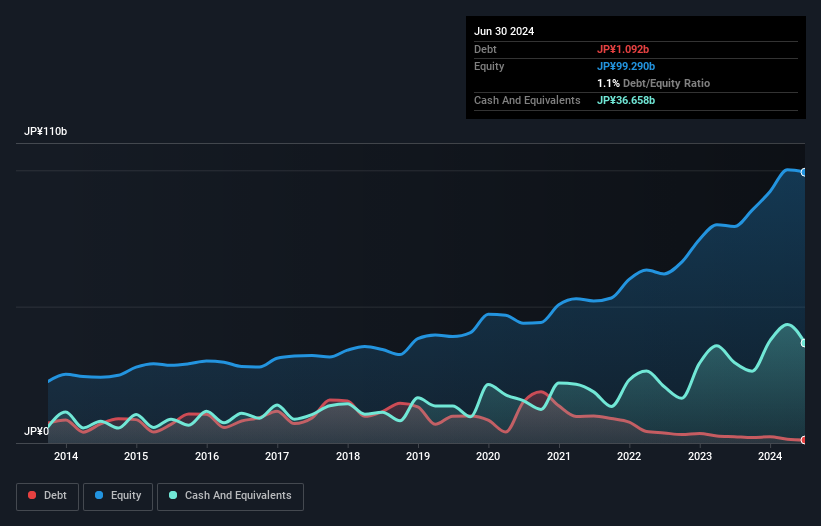Some say volatility, rather than debt, is the best way to think about risk as an investor, but Warren Buffett famously said that 'Volatility is far from synonymous with risk.' It's only natural to consider a company's balance sheet when you examine how risky it is, since debt is often involved when a business collapses. As with many other companies Goldwin Inc. (TSE:8111) makes use of debt. But the real question is whether this debt is making the company risky.
What Risk Does Debt Bring?
Generally speaking, debt only becomes a real problem when a company can't easily pay it off, either by raising capital or with its own cash flow. Part and parcel of capitalism is the process of 'creative destruction' where failed businesses are mercilessly liquidated by their bankers. However, a more common (but still painful) scenario is that it has to raise new equity capital at a low price, thus permanently diluting shareholders. Having said that, the most common situation is where a company manages its debt reasonably well - and to its own advantage. When we examine debt levels, we first consider both cash and debt levels, together.
Check out our latest analysis for Goldwin
What Is Goldwin's Debt?
You can click the graphic below for the historical numbers, but it shows that Goldwin had JP¥1.09b of debt in June 2024, down from JP¥2.31b, one year before. However, it does have JP¥36.7b in cash offsetting this, leading to net cash of JP¥35.6b.

How Strong Is Goldwin's Balance Sheet?
We can see from the most recent balance sheet that Goldwin had liabilities of JP¥30.6b falling due within a year, and liabilities of JP¥4.92b due beyond that. Offsetting this, it had JP¥36.7b in cash and JP¥17.6b in receivables that were due within 12 months. So it actually has JP¥18.7b more liquid assets than total liabilities.
This short term liquidity is a sign that Goldwin could probably pay off its debt with ease, as its balance sheet is far from stretched. Succinctly put, Goldwin boasts net cash, so it's fair to say it does not have a heavy debt load!
The good news is that Goldwin has increased its EBIT by 6.9% over twelve months, which should ease any concerns about debt repayment. When analysing debt levels, the balance sheet is the obvious place to start. But ultimately the future profitability of the business will decide if Goldwin can strengthen its balance sheet over time. So if you want to see what the professionals think, you might find this free report on analyst profit forecasts to be interesting.
Finally, while the tax-man may adore accounting profits, lenders only accept cold hard cash. Goldwin may have net cash on the balance sheet, but it is still interesting to look at how well the business converts its earnings before interest and tax (EBIT) to free cash flow, because that will influence both its need for, and its capacity to manage debt. Over the last three years, Goldwin recorded free cash flow worth a fulsome 81% of its EBIT, which is stronger than we'd usually expect. That puts it in a very strong position to pay down debt.
Summing Up
While it is always sensible to investigate a company's debt, in this case Goldwin has JP¥35.6b in net cash and a decent-looking balance sheet. The cherry on top was that in converted 81% of that EBIT to free cash flow, bringing in JP¥17b. So is Goldwin's debt a risk? It doesn't seem so to us. Above most other metrics, we think its important to track how fast earnings per share is growing, if at all. If you've also come to that realization, you're in luck, because today you can view this interactive graph of Goldwin's earnings per share history for free.
If, after all that, you're more interested in a fast growing company with a rock-solid balance sheet, then check out our list of net cash growth stocks without delay.
New: Manage All Your Stock Portfolios in One Place
We've created the ultimate portfolio companion for stock investors, and it's free.
• Connect an unlimited number of Portfolios and see your total in one currency
• Be alerted to new Warning Signs or Risks via email or mobile
• Track the Fair Value of your stocks
Have feedback on this article? Concerned about the content? Get in touch with us directly. Alternatively, email editorial-team (at) simplywallst.com.
This article by Simply Wall St is general in nature. We provide commentary based on historical data and analyst forecasts only using an unbiased methodology and our articles are not intended to be financial advice. It does not constitute a recommendation to buy or sell any stock, and does not take account of your objectives, or your financial situation. We aim to bring you long-term focused analysis driven by fundamental data. Note that our analysis may not factor in the latest price-sensitive company announcements or qualitative material. Simply Wall St has no position in any stocks mentioned.
About TSE:8111
Flawless balance sheet, good value and pays a dividend.
Market Insights
Community Narratives





